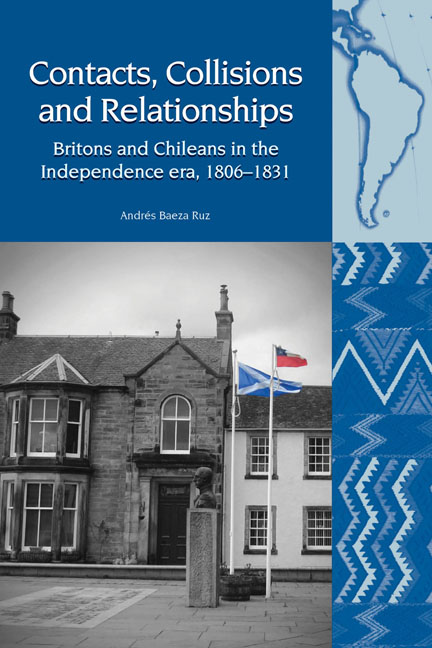Book contents
- Frontmatter
- Contents
- Acknowledgements
- Abbreviations
- Preface
- Introduction
- 1 Invasions, Negotiations and Conspiracies: British-Chilean Relations in an Era of Change, 1806–1817
- 2 Cultural Encounters Offshore: Britons and Chileans in the Chilean Navy, 1817–1823
- 3 Bibles, Schools and Citizens: British Protestant Missionaries and Educators in Chile, 1817–1831
- 4 British Merchants, Private Interests and the Fostering of Free Trade in Chile, 1811–1831
- 5 Beyond Diplomacy: The Cultural Significance of British Recognition of Chile's Independence, 1817–1831
- Conclusion
- Bibliography
- Index
Introduction
- Frontmatter
- Contents
- Acknowledgements
- Abbreviations
- Preface
- Introduction
- 1 Invasions, Negotiations and Conspiracies: British-Chilean Relations in an Era of Change, 1806–1817
- 2 Cultural Encounters Offshore: Britons and Chileans in the Chilean Navy, 1817–1823
- 3 Bibles, Schools and Citizens: British Protestant Missionaries and Educators in Chile, 1817–1831
- 4 British Merchants, Private Interests and the Fostering of Free Trade in Chile, 1811–1831
- 5 Beyond Diplomacy: The Cultural Significance of British Recognition of Chile's Independence, 1817–1831
- Conclusion
- Bibliography
- Index
Summary
In April 2014, during the third year of my doctoral studies, I made a research trip to Edinburgh with my family to review the documents of Thomas Cochrane that are held in the National Archive of Scotland. We had always wanted to visit the city and it seemed like a good opportunity. We also travelled at a particular time, only a few months before the referendum to decide whether Scotland would remain in the United Kingdom. This was really significant. I could witness how a considerable part of Scottish society was calling into question the idea of a British ‘nation’, whose existence I was convinced of after reading Linda Colley's classic Britons and witnessing the Olympic Games that took place in London in 2012. The possibility of reviewing Cochrane's personal documents, the beauty of the city and this historical moment made of our trip an unforgettable experience.
However, our trip to Edinburgh was unforgettable for another reason. Coincidentally, one of my supervisors at the University of Bristol was on holiday nearby and we agreed to spend a day with him and his family. In the middle of a conversation about the purpose of my trip, he remembered that the town where Thomas Cochrane was born, Culross, was relatively close. His father knew the place and gave us the references to get there. It took us forty-five minutes to reach the middle of the town, a royal burgh with no more than 5,000 inhabitants and whose central square occupies a large part of its territory. For me, a Chilean historian concerned with the relations between my country and Great Britain in the independence era, being there was impressive. I was in the middle of Scotland, in a small town in whose central square there was a magnificent bust of Thomas Cochrane accompanied by the Scottish and Chilean flags.
I never expected to find a Chilean flag waving in a place like that. It is usual to see the Chilean flag around the world in football stadiums, tennis courts, university campuses, but not in the central square of a British village. I was surprised – and amazed – and some questions quickly came to my mind: How was it possible that the Chilean flag formed part of the everyday life of the inhabitants of this small village?
- Type
- Chapter
- Information
- Contacts, Collisions and RelationshipsBritons and Chileans in the Independence era, 1806-1831, pp. 1 - 25Publisher: Liverpool University PressPrint publication year: 2019



